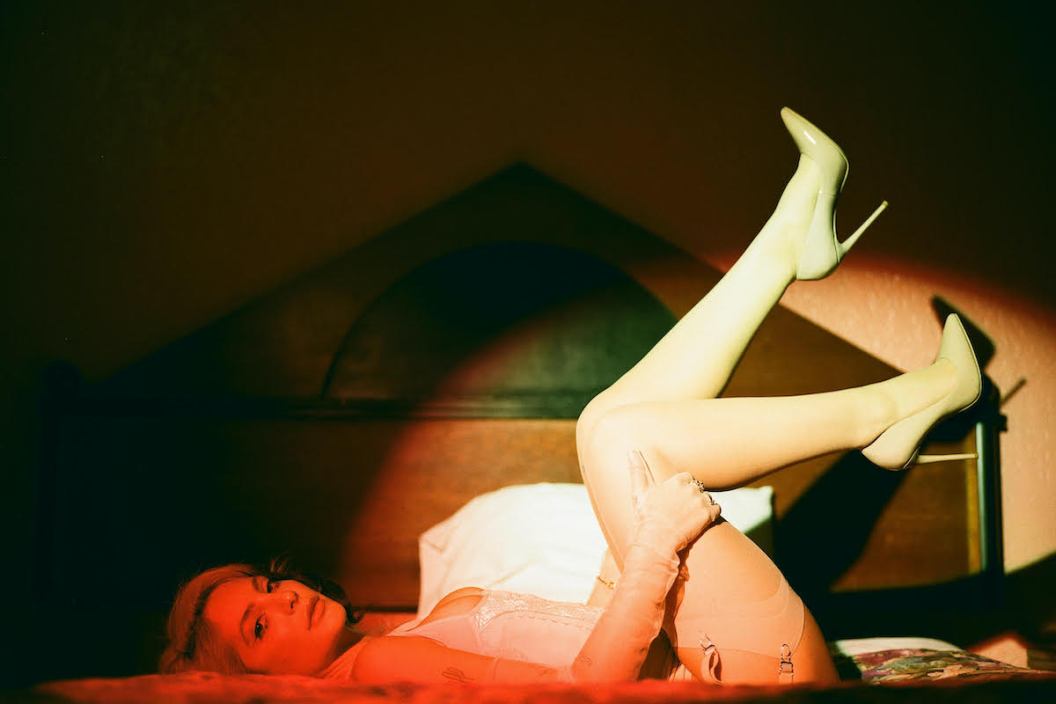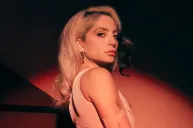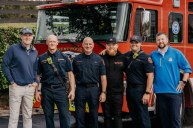Though Lou Ridley describes her musical approach as "anti-country country," her new EP Angel/Outlaw (out Dec. 2) and the artist behind it suit Nashville at a time when broader social change challenges outdated notions about the genre's creators and consumers.
Videos by Wide Open Country
Ridley moved to Nashville from Los Angeles during the pandemic after the song "Poor Baby" caught the attention of country tastemakers.
"I put out a song, and my now attorney at the time was like, 'Hey, this is kind of country, and some people in country are talking about you. Can you come out to Nashville and let me show you around and get you a session. I think you'd really like it. I think you'd do well here'," she told Wide Open Country. "I was like sure, because I grew up in Texas so I'm from the South. I came out here and I fell in love, so a month later, I moved."
Like many creative types with less-than-ideal memories of rural American childhoods, Ridley threw the country music baby out with the proverbial bath water before being drawn back to a time-tested way to tell one's truth.
"For a while, I really rejected country because I grew up on it, and as we all know by this point, I didn't have the best time growing up," she said. "It's something I tried to depart from for a while. But as I got older and I got back into my own skin, I was like, yeah, this is just a huge part of my identity. I grew up on a ranch with chickens and horses. This is just who I am. I think during the pandemic when I had a lot of time to be alone, I was able to really settle into my identity."
For an example of how Ridley's unflinching individuality challenges country convention, check out "Hometown." It sums up her frustrations as a small-town outcast while counterbalancing the beaucoups of songs by more typical country artists correlating high school with simpler and better times.
"God bless that you had such a nice time, but it's just not realistic and I think that's part of the thing I'm really trying to break the narrative of in country is there's just one way to be in country music," she said. "That's just not representative of I would say a majority of people, whether they're in Nashville or anywhere else. We exist everywhere. We've got to start pushing the conversation forward a little bit. We can't still be talking about the same shit from 20 years ago, you know what I mean?"
To be fair, such recent songs as Priscilla Block's "Peaked in High School" and Tyler Braden's "Secret" paint honest pictures of how neighbors knowing each others' business sometimes pans out, so Ridley's not alone in countering flowery nostalgia with brutal realism. Still, she deserves praise for injecting her pain into a song that earns country music's most misused and misunderstood adjective: authentic.
"Now I'm not running from who I am," Ridley added. "I'm more so just embracing that it's a little left of center instead of trying to be something else. I think if I would have had a different experience growing up, maybe I would have just been more typical of what we see when we see and hear country. Thankfully, I had some crazy shit happen."
Ridley, a human rights advocate straight out of Hollywood, doesn't tone down her truth, in song or while navigating the Nashville machine.
"It's easy for me to call myself an advocate and an activist when I'm living in LA and everybody's extremely liberal in the way that they view things," she said. "It's less fun to be a voice in a place like this because I am going against the grain. When I moved here, I was like, 'Okay, if I'm going to do this, if I'm going to have this big set of balls I think I have, then let's go all the way with it.' What I've been in practice of since coming here is respecting others but trying to have a different conversation."
So far, Ridley's found one positive Southern stereotype--the one about hospitality--to be true.
"People here are warm and inviting," she said. "I told a couple of other people that in LA, it's not about the music anyway a lot of the time. Here, if people like you and they believe in you, they want to open their contacts to you. They want to help you. They want to push you forward. That's not something you get most places."
She's also meeting peers with similar values amid the constant parade of kindness.
"I'm excited that I've been embraced as well as I have because obviously I know there's a lot of tradition still left in country music," Ridley said. "When I came here, I was like, 'Okay, I guess I'll see if everybody hates me or what happens.' It's been really fun and I'm definitely not the only artist doing it, which is what's so exciting. I get in these writers' rooms, and I'm blown away by the amount of people that are having the same conversations I'm having. It's so exciting to get to work with some of these artists that have bigger platforms and are doing this kind of thing. I'm excited for Nashville to catch up because country music was derived from soul music and we've since departed. I do think we're coming to a place where we're welcoming more people into the genre and kind of just genre-bending a little bit."
That's not to say that she's ready to make nice as country music slowly inches toward a better tomorrow.
"Nashville to me is the LA of the South," she explained. "People are embracing and they want a different narrative to be pushed. Even before I moved here, I was introduced to this idea of the Song Suffragettes and some of the female empowerment movements that are happening. There was already stuff that was moving, but I think it takes a group of us who are really not afraid to piss people off in order to really kick the door down. A lot of people have something to say, but they don't want to upset the powers that be. I understand that and respect it, but then there's some of us who don't give a shit."
Read More: 5 Definitive Appalachian Folk Songs From Charles Wesley Godwin's 'How the Mighty Fall'
Ridley was involved throughout the EP creation process, less to blaze a path for women producers in Nashville and more as a habit born from past necessity.
"When I was in LA, I couldn't find people to work with, so I'd pay a guy to come over and teach me how to do it myself because I just had music to get out of my head and I didn't have anybody to do it with," she said. "I was kind of forced into building my home studio and learning because I didn't have any other way to make it happen. Cowgirls Don't Cry was literally me producing everything with one of my friends, that first EP I put out."
Co-producing with friends is another circumstance that placed Ridley on a less typical path to country acclaim and shaped Angel/Outlaw into something refreshingly different than whatever's climbing the airplay charts or trending on TikTok.
"When I go into these sessions, people are like, 'Oh wait, you know this and you know that?' I'm like, 'Doesn't every artist know this stuff?'," she added. "But I forget that a lot of people had different situations. I'm really grateful that I was so isolated with everything because it really taught me a lot that helps me navigate these rooms here in Nashville."




